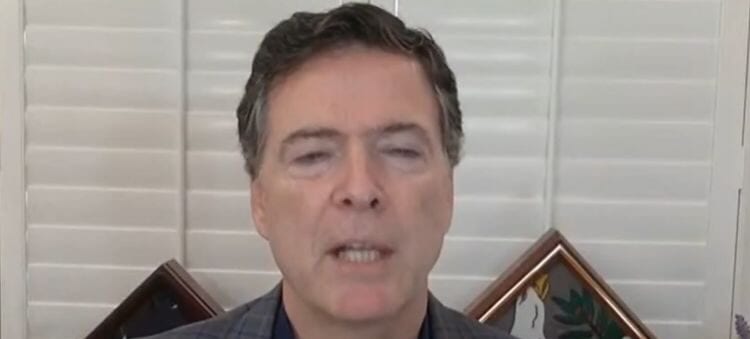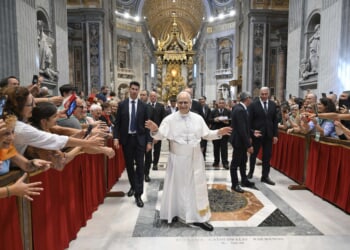George Papadopolous, advisor to the Trump campaign, sat in handcuffs and leg shackles, surrounded by six FBI agents in the bowels of Dulles Airport. He was arrested but given no phone call, no lawyer. No one read the charges against him, but one of the FBI agents provided a clue.
“This is what happens when you work for Trump,” he snarled.
The tissue-thin case against Papadopolous zoomed up to the highest level of the FBI in a matter of days and triggered a five-alarm fire at the bureau.
After several hours, the agents shuffled him into a black SUV, drove to a detention center, and locked him behind bars with a couple of rough-looking cellmates for company. He didn’t sleep much. The bright lights burning all night didn’t help.
The next day, jet-lagged, exhausted and living in the same clothes for two days, he was arraigned without the benefit of legal counsel. The prosecutor charged him with lying to the FBI and obstruction of justice. The penalty? A 25 year prison sentence. Papadopolous, stunned and disoriented, returned to his cell.
What evidence supported these weighty crimes? In an earlier interrogation by the FBI in a different airport, Papadopolous, without access to his phone or calendar, misremembered the date of a meeting (lying to the FBI). On the advice of counsel, he deleted his Facebook page (obstruction of justice).
The next day, the prosecutor announced that Papadopolous agreed to cooperate and released him. Only one problem: no one consulted him. Deep State Target, George Papadopolous.
What’s going on here?
How did an unpaid consultant to the Trump campaign earn the wrath of the FBI? More to the point, whom did he displease to receive such abuse?
Here’s what happened.
December 2015 — August 2016. High-ranking FBI agents Peter Strzok and Lisa Page, (who happened to be lovers, just not to their spouses), express a very clear prejudice against Trump in numerous emails, one of which says:
Page: [Trump’s] not going to become president, right? Right?!
Strzok: No. No, he’s not. We’ll stop it. (The Durham Report, page 50)
March 2016. Trump names Papadopolous as an advisor to his campaign, based upon his expertise in foreign affairs.
May 2016. Papadopolous meets two Australian diplomats for drinks in London. According to one of the diplomats, Papadopolous says the Trump campaign received dirt on Hillary Clinton from the Russians. Papadopolous and the other diplomat deny the comment. (Durham, page 53)
July 2016. The Australian government sends a cable to the U.S. Embassy in London, in which the Russian allegation is repeated. However, the Australians hedge by saying it is possible the Trump campaign received the information from public sources. They hedge even further by saying: “It was also unclear how Mr[.] Trump’s team reacted to the offer. We note the Trump team’s reaction could, in the end, have little bearing of [sic] what Russia decides to do, with or without Mr[.] Trump’s cooperation.” (Durham, page 52)
July 2016. Three days after the FBI receives this raw and unverified information, Strzok opens Crossfire Hurricane, a full investigation into the Trump campaign, at the direction of Andrew McCabe, who reports directly to FBI Director James Comey. Comey greenlights Crossfire Hurricane shortly afterwards. (Durham, page 48)
August 2016. Strzok meets with the Australian diplomats in London to clarify their bar conversation with Papadopolous. In a taxi, Strzok says to his opposite number in U.K. intelligence: “there’s nothing to this, but we have to run it to ground.” (Durham, page 60)
August 2016. The FBI and the same U.K intelligence agent who worked the interviews of the Australian diplomats have the following exchange:
U.K. Agent: “Dude, are we telling them [British Intelligence Service] everything we know, or is there more to this?”
FBI Agent: “that’s all we have, not holding anything back.”
U.K. Agent: “Damn that’s thin.”
FBI Agent: “I know. It sucks.” (Durham, page 61)
August 2016. After the disappointing interviews with the Australian diplomats, the FBI nevertheless opens full investigations into other high-ranking members of the Trump team, including General Michael Flynn (National Security advisor) and Paul Manafort (campaign manager) because they had:
“either ties to Russia or a history of travel to Russia.” (Durham, page 64)
September 2016. FBI secretly records two conversations between Papadopolous and an FBI informant. Papadopolous clearly says that he is not aware of any collaboration between the Trump campaign and Russia. In fact, he states that such activity would be illegal and treasonous. (Durham, page 242)
October 2016 – May 2017. FBI secretly records 23 separate conversations between Papadopolous and his personal friend, who was working for the FBI. The friend baited Papadopolous with 200 prompts which elicited 174 exculpatory comments. The following exchange is typical:
Friend: Do you think the Russians would come and kill you if you said something? The Russian Mafia?
GP: I have nothing to do with the Russians.
Friend: If Russia [expletiveJ meddled in our elections, what else are they controlling about us? That just makes America look weak.
GP: I still don’t believe that [they did]. (Durham, pages 223 and 227)
May 2017. The Department of Justice appoints Robert Mueller, former FBI Director, as special counsel, with wide ranging powers, to continue the work of Crossfire Hurricane.
October 2017. Mueller prosecutes Papadopolous to pressure other members of the Trump team to cooperate. Looking at many years in prison, Papadopolous pleads guilty of lying to the FBI. He is later incarcerated for 12 days followed by 12 months of supervised release and suffers financial ruin.
March 2019. Mueller determines the Trump campaign did not conspire or coordinate with the Russian government in its election interference activities. (The Mueller Report, page 173)
March 2018 – May 2023. Subsequent probes by Inspector General Horowitz and Special Prosecutor Durham uncover no evidence of any conspiracy between Trump and Russia. Both reports sharply criticize the tactics of the FBI.
Thuggish detentions, phony charges, secret surveillance, show trials, forced confessions, shackles, financial ruin. These are the tactics of a police state in the service of one man, James Comey.
The FBI took an obscure bar conversation and turned it into sprawling, out-of-control federal investigation (Crossfire Hurricane) which turned into a sprawling, out-of-control special prosecution (Mueller), that nearly took down a sitting U.S. president. To this day, half the nation still believes that Trump is compromised by Russia, largely based on the dishonorable actions of the FBI.
After receiving the cable from the Australian diplomats, the FBI could have paused to corroborate the evidence against Papadopolous. They could have begun an assessment or even a preliminary investigation, both less intrusive FBI actions. But instead, Page, Strzok and McCabe unanimously agreed to open a full investigation, the bureau’s equivalent of Defcon 5, after only three days of deliberation. A full investigation ensured that the entire weight of the FBI would land on Papadopolous, including surveillance, detention, and jail threats.
Is this normal? Does the FBI employ such harsh tactics in all cases of political corruption? To answer this question, it is helpful to compare the FBI treatment of Trump to that of Hillary Clinton.
In early 2016, three different FBI field offices opened investigations into the Clinton Foundation, largely based on the book, Clinton Cash, which provided a well-documented roadmap to corruption at the Foundation. McCabe instructed the field offices to close their cases. When the field offices resisted, Comey directed them to “cease and desist.” (Durham, page 80)
In late 2014, the FBI learned that a foreign government was planning to make a contribution to Clinton in exchange for future favors. The source was well-placed. Nevertheless, the FBI delayed the field work for four months because: “They were pretty ‘tippy-toeing around HRC because there was a chance she would be the next President.” (Durham, page 69)
The FBI provided defensive briefings to Clinton, which put her on alert to possible future surveillance, a courtesy they did not extend to Trump during the campaign. Nothing ever came of the Clinton probe.
The tissue-thin case against Papadopolous zoomed up to the highest level of the FBI in a matter of days and triggered a five-alarm fire at the bureau. Meanwhile, Comey buried much more credible evidence of corruption against Clinton.
It is quite clear that the leadership of the FBI tried to influence the 2016 election in favor of Clinton. They adopted the strong-arm tactics of their mortal enemy, Russia, to undermine Trump. Ironically, Comey’s FBI committed the very crime they said they were trying to prevent: election interference.
It was not their finest hour.
READ MORE from Kevin Brady:
A Cliff Note Guide to Russiagate: The Hillary Coverup
The Demographic Winter of Our Discontent
Democrats Wage Lawfare Against Trump








![Florida Officer Shot Twice in the Face During Service Call; Suspect Killed [WATCH]](https://www.right2024.com/wp-content/uploads/2025/12/Inmate-Escapes-Atlanta-Hospital-After-Suicide-Attempt-Steals-SUV-Handgun-350x250.jpg)

![Keith Ellison Caught Promising to Fight State Agencies for Somali Fraudsters [WATCH]](https://www.right2024.com/wp-content/uploads/2026/01/Keith-Ellison-Caught-Promising-to-Fight-State-Agencies-for-Somali-350x250.jpg)






